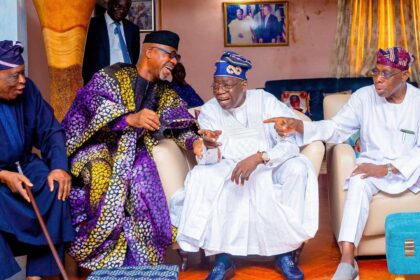[ad_1]

This month, the chairman of the Independent Corrupt Practices Commission, Musa Aliyu, brought senior journalists described as “northern Nigeria media editors” to Abuja.
He apparently wanted to showcase his achievements and describe how difficult it is to fight corruption.
Aliyu was concerned that corruption in the Nigerian public sector thrives “despite the efforts of the anti-corruption agencies.”
He regaled the editors with stories of ICPC bravado to buttress the point that corrupt officials manipulate the judicial process to escape sanction and protect their proceeds.
One of his stories was of a certain hospital, or better still, non-hospital, somewhere in the Federal Republic.
“There was a case of a hospital that was paid 100 per cent five times,” he told the assembled journalists. “Yet, there was nothing to show for it.”
I do not know if the journalists gasped or stopped eating.
Also, this month, the federal government announced new spending of over N4.2tn on roads.
It includes the ‘second phase’ of the Lagos-Calabar Coastal Road, which will cost N1.334tn to construct 130 kilometres.
Remember that when the highway was first announced, Works Minister, David Umahi, proudly stated that it would feature round-the-clock lighting, security posts, medical facilities, and presumably rest stops.
The Minister also announced that N195bn would be allocated to the reconstruction of ‘Phase 2, Section 1’ of the Lagos-Ibadan Expressway for something described as ‘improving traffic flow and reducing congestion.’
He further stated that the Abuja-Kano road has been restructured into two lots, adding that the total length is now 118 kilometres—no details, no deadlines.
Regarding the reconstruction of the Lokoja-Benin road, Umahi said it would be carried out in three sections at a total cost of N305bn: Obajana to Benin (Section I) at N64bn; Auchi to Edo (Section II) at N110bn; and the Benin Airport area (Section III) at N131bn.
Also this month, the Senate Public Accounts Committee hosted the Inspector General of Police, Kayode Egbetokun, over the subject of nearly 200,000 missing firearms arising from a report of the Auditor General of the Federation.
The IGP showed up after the committee threatened to have him arrested by his own men.
It was no surprise that Egbetokun appeared not to know anything about any missing firearms.
He pleaded “other official matters” and was let go. In the hours that followed, police spokesman, Olumuyiwa Adejobi, declared no firearms to be missing under Egbetokun.
What is the missing link here? Let me take this back-to-front.
It is to be expected that the missing police firearms story would be vigorously denied by the top brass of the force.
Adejobi’s denial, for instance, is not really that the audit is wrong, but that no weapons are missing under Egbetokun.
The missing link is the indifferent media reporting of the issue. This matter first broke into the open early in 2022 when the Auditor-General’s report for 2019 appeared, declaring “The total number of lost firearms as reported as of December 2018 stood at 178,459 pieces. Out of this number, 88,078 were AK-47 rifles.”
Following news reports, the House of Representatives threw into the frenzy a body it called the “Ad hoc Committee on Arms.”
In “The National Assembly Is In Decay,” I said the matter proved that the political elite does not read the reports of the Auditor-General, which was annually littered with similar revelations.
I predicted that the committee would disappear quietly and that there would be “no report detailing the nation’s booming industry in disappearing police equipment.”
I was right. And now, it is the Senate which is going through the same motions. But in every Auditor-General’s report in the past 10 years, he has screamed himself hoarse about the alarming rate at which police equipment, of which arms and ammunition are only one part, are disappearing.
The founding fathers forgot to deploy aliens to implement the Auditor-General’s report, so even the police have become a part of the malfeasance.
The media, for its part, appears to be indifferent.
Take the example of the Lagos-Calabar Coastal Highway and other roads. Remember when Minister Umahi widely announced that it would be a 10-lane marvel of six major and four service lanes?
President Tinubu described it as “world-class” infrastructure. “Today is my day to boast,” he said of the massive project, which had enjoyed neither legislative approval nor competitive bidding. “The deal is done. The dream is realizable…We said we would build this road, and we are determined to do it.”
In that same May 2024, a marginalized House of Representatives swore to commence “a comprehensive investigation” of the project.
It never did. Only a few months in, the government said it would downgrade it from 10 lanes to six. It is hoping to launch the “first phase,” about 25 kilometres, on the government’s midterm anniversary this May.
As Minister Umahi spoke this month, it was unclear whether his 130 kilometres’ N1.334tn would be spent on the original design or the slimmed-down “dual carriageway.”
Nor was it clear why the government is spending a whopping N195bn on the Lagos-Ibadan expressway that has only just been completed, rather than on reconstructing one of the washed-out highways, such as the abandoned Sagamu-Ore.
Nobody asked him about the Abuja-Kano Road, either. And nobody is reporting the Julius Berger story.
In January 2024, Umahi praised the excellence of that contractor, saying, “…Only Julius Berger can do it,” and “I am very sure if we pay Julius Berger according to the commitment on funding, they will complete the job.”
He said: “From Kaduna to Zaria is completed. We have only 20 kilometres between Zaria and Kano, and then we have 40 or 38 kilometres from zero point.”
But then curiously, he canceled the contract and handed it to Hitech, President Tinubu’s friends, who also happen to be feasting on the Lagos-Calabar and Sokoto-Badagry buffets.
The Minister is also now going to spend N305bn on Lokoja-Benin, the same road he previously promised to deliver in September 2024. This time, he gave no apologies and no details, such as a timeframe.
Finally, the ICPC. No, Aliyu, corruption is not widespread in the Nigerian public sector despite the efforts of the anti-corruption agencies: it is widespread because your agencies are complicit!
The first thing we must do is dispense with such excuses and cliches as “when you fight corruption, corruption fights back.”
Who is fighting corruption? Is it the same institutions that, armed with wide powers, deploy them to protecting the corrupt?
ICPC has since 2019 done an excellent job of tracking constituency projects, which—in the absence of demonstrable, viable projects—are but another slush fund for politicians. But how many politicians have been named and prosecuted? If none, where are the projects?
Aliyu provided the worst-case scenario by detailing one of thousands of projects paid for several times. Are we supposed to applaud him for protecting the crooks?
To be clear: podium conquest before journalists is not fighting corruption. Telling the whole truth and naming names, is. Publishing reports of your activities, even if the law does not demand it, is.
And then, whatever weak government agencies do or do not, journalists asking questions is critical. A journalist without aggression is at best in the wrong trade.
[ad_2]
Source link







